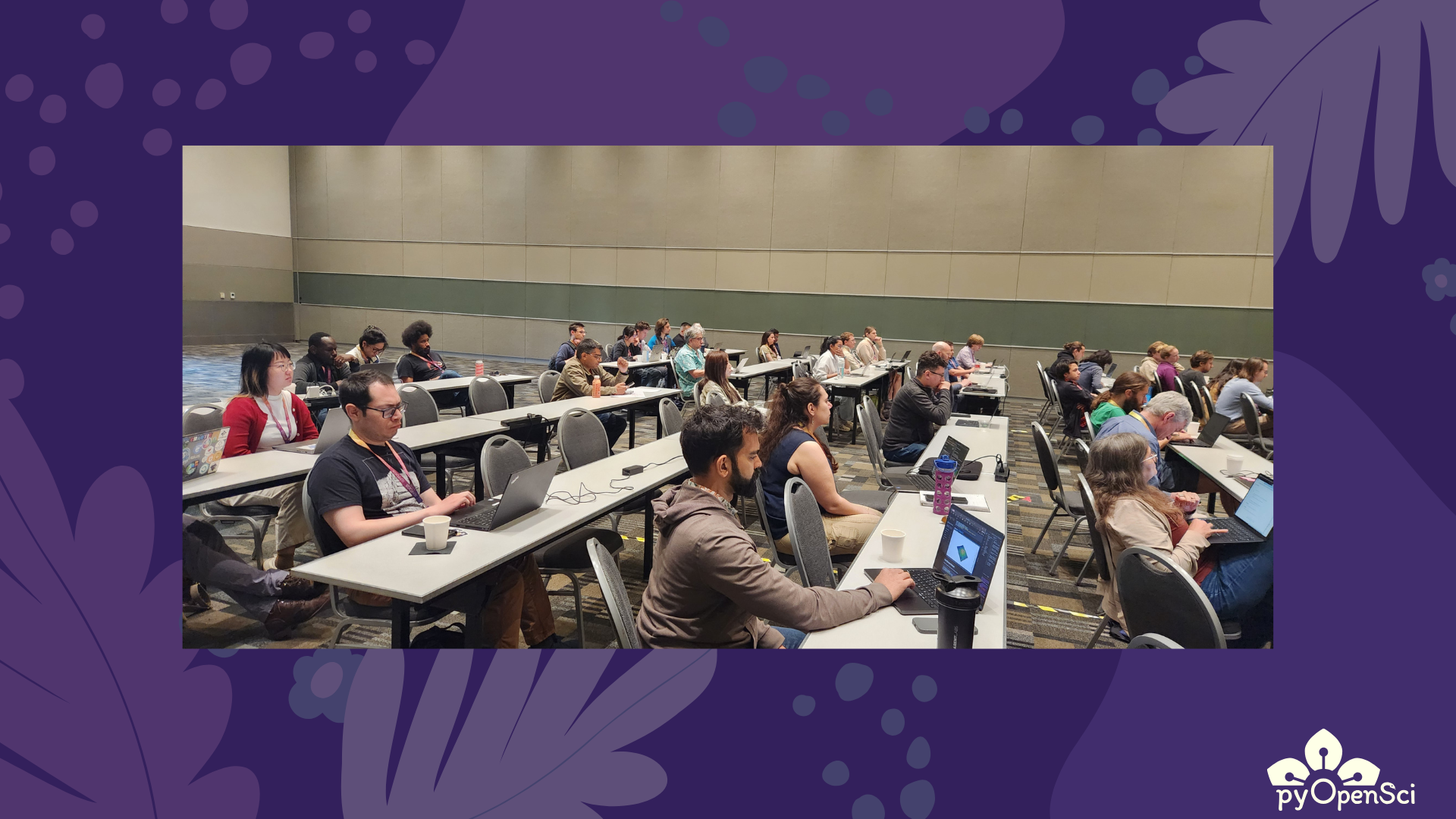
SciPy 2025 was one for the books, and for pyOpenSci, it was a powerful reminder of how far our community has come and how much energy we bring when we show up together.
This year, more than 15 members of the pyOpenSci community participated in the conference. We hosted a workshop, facilitated a BoF session with over 60 participants, gave talks, and filled the hallway track with laughter, advice, and real conversations about scientific Python pain points and the future of research software. We also led a community sprint where contributors opened over 30 issues and pull requests—an incredible showing of collaboration across experience levels.
To help new contributors feel supported, we shared our ‘Contribute to Open Source’ lessons, which walk you through the process of making your first contribution in a welcoming, beginner-friendly way.
Here are a few additional highlights from the week.
⚙️ Workshops: Packaging tools, templates, and fast-track setups
We kicked off SciPy with our pyOpenSci packaging workshop, where we introduced participants to our user-friendly packaging template and taught modern packaging practices using Hatch. This was the second time we used the template in a live setting, and it was just as smooth as we hoped. Answer a few questions, and boom! You’ve got a working, standards-compliant Python package.
We love Hatch because it includes a task runner out of the box (see the Scientific Python Development Guide for why that matters), and it integrates seamlessly with UV. Hatch has supported UV under the hood for a while, and with a single config line in your pyproject.toml, you can enable UV’s speed in your workflow. (We’ve already baked that into our template.)
Shoutout to Carol Willing, Inessa Pawson, Jeremiah Paige, and Tetsuo Koyama for making this workshop such a success.
We also attended the Pixi workshop, which showcased how Pixi utilizes UV and supports mixed PyPI/Conda environments. The instructors walked us through spinning up cloud-based GPU compute using NVIDIA Brev, which was quick, powerful, and surprisingly easy to configure. Pixi is a great option for you if you want the speed of UV but the Conda support!
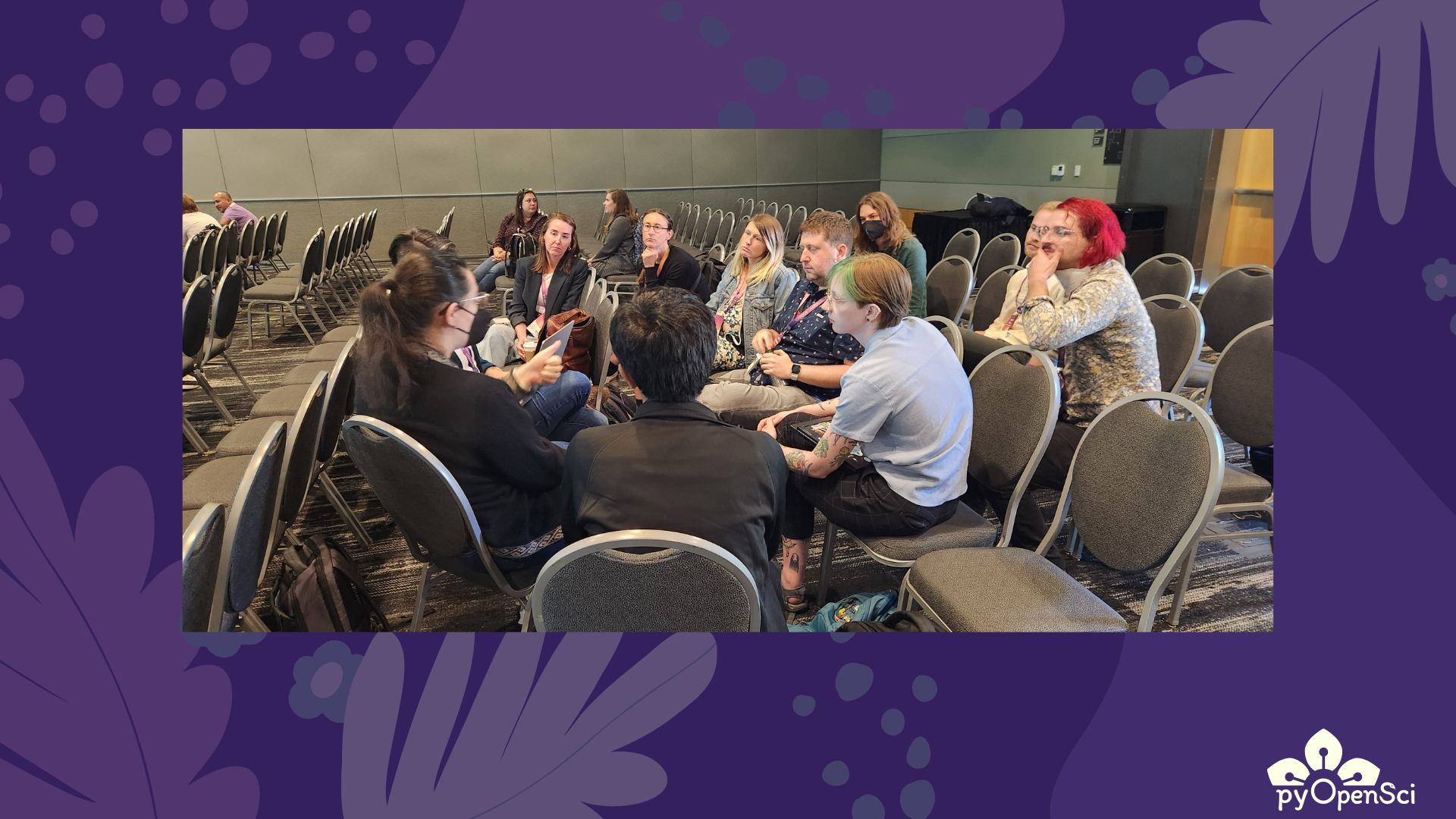
BoF: Breaking Down Pain Points, Together
Our “Packaging Pain Points” BoF (Birds of a Feather) session drew over 60 participants and an incredible buzz of energy! We split into small groups to talk about the social and technical challenges researchers face when sharing Python code and workflows. The conversation was honest, collaborative, and energizing.
We’ll share a dedicated post soon about the insights we gathered, but one thing is already clear: when we come together to name what’s hard, we create the conditions for real, inclusive solutions.
Huge thanks to Leah Wasser, Jonny Saunders, Avik Basu, Jeremiah Paige, Inessa Pawson, Tetsuo Koyama, and everyone who helped make the session run smoothly.
Sprinting Toward Sustainable Software
Our final-day sprint was one of the most vibrant and heartening moments of the week. The pyOpenSci community showed up in full force—so much so that we had to push two sets of tables together to fit everyone. The room buzzed with activity as over 30 issues and pull requests were opened in just one day, many from first-time contributors.
What made it especially powerful? Experienced maintainers paired up organically with newcomers, walking them through the setup process, answering questions, and celebrating small wins. It was a clear embodiment of the pyOpenSci ethos: mentorship, openness, and shared learning.
To support folks new to open source, we shared our Contribute to Open Source lessons, which walk through how to make your first contribution in a supportive and beginner-friendly way. These lessons helped ease people into the sprinting process and gave them the confidence to get started.
We’re grateful to everyone who joined, and especially to those who made their very first open source contributions with us. If you were there, you helped make something truly special.
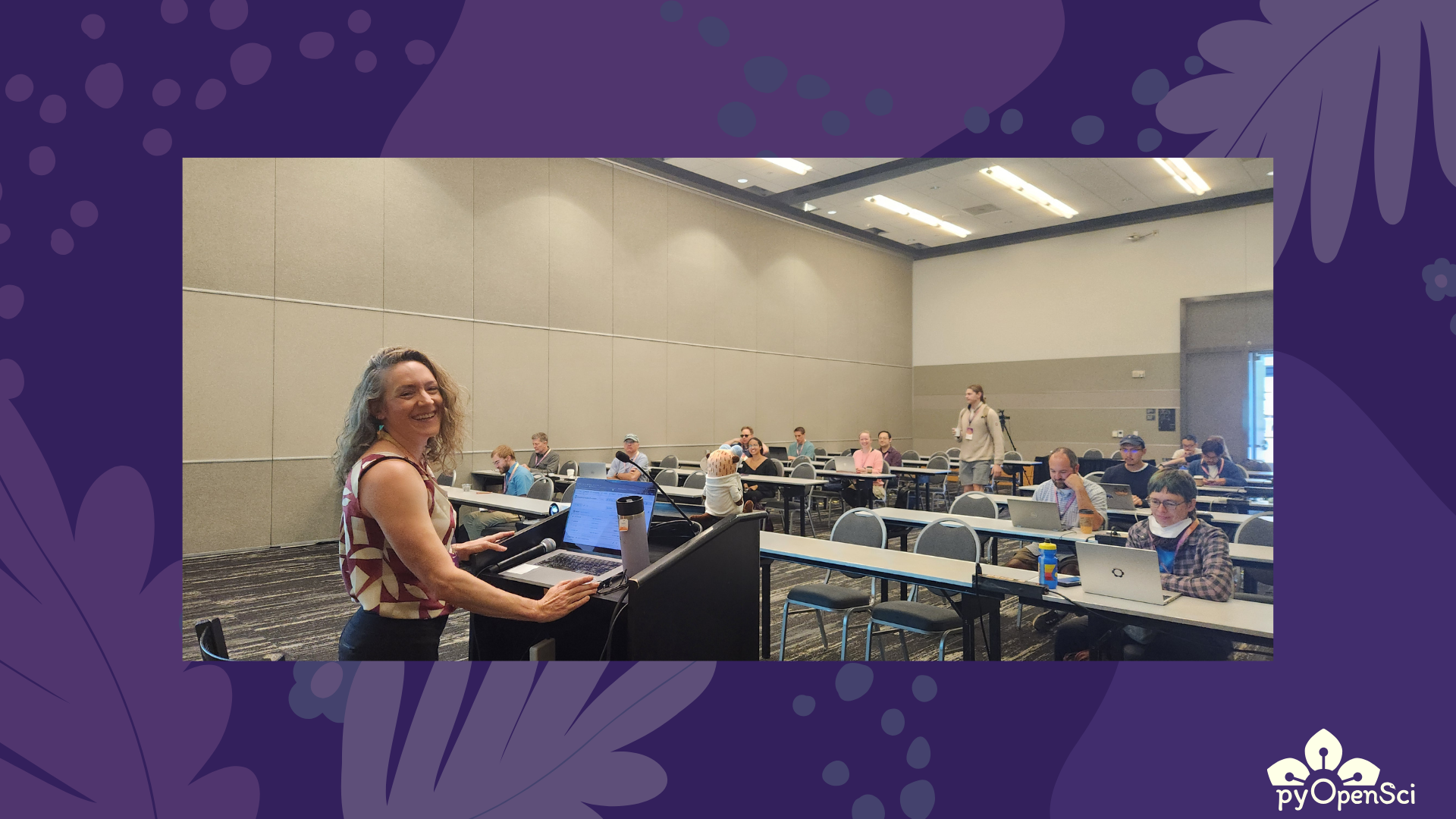
Talks, Lightning Talks, and the Hallway Track
We’ll be honest, there were too many great talks at SciPy to cover them all. But we want to highlight a few of the more memorable lightning talks from our community this year:
- Jonny Saunders gave an epic lightning talk that highlighted some of the challenges LLMs pose to the open-source and scientific communities. This license, for those who missed it, gives you a flavor of what happened during the talk!
- Yuvi Panda delivered a deeply relatable talk on therapy, open source, and why maybe—just maybe—you should choose the former before the latter.
- Leah Wasser discussed our pyOpenSci mission to address social and technical pain points in scientific open source and reflected on the role of software peer review in supporting reproducible, high-quality research.
- Tetsuo Koyama gave a lively demo of PyVista, a powerful 3D visualization library built on VTK and used by over 2,000 open source projects. Designed as the 3D equivalent of Matplotlib, PyVista makes it easy to create beautiful, interactive 3D visualizations right from Python with no prior VTK knowledge needed.
And of course, we couldn’t wrap up the week without a shoutout to the SciPy Song—a tradition that keeps getting better every year! This year’s version, crafted by Naty Clementi, Juanita Gomez, and Paige Martin, even featured a nod to pyOpenSci!
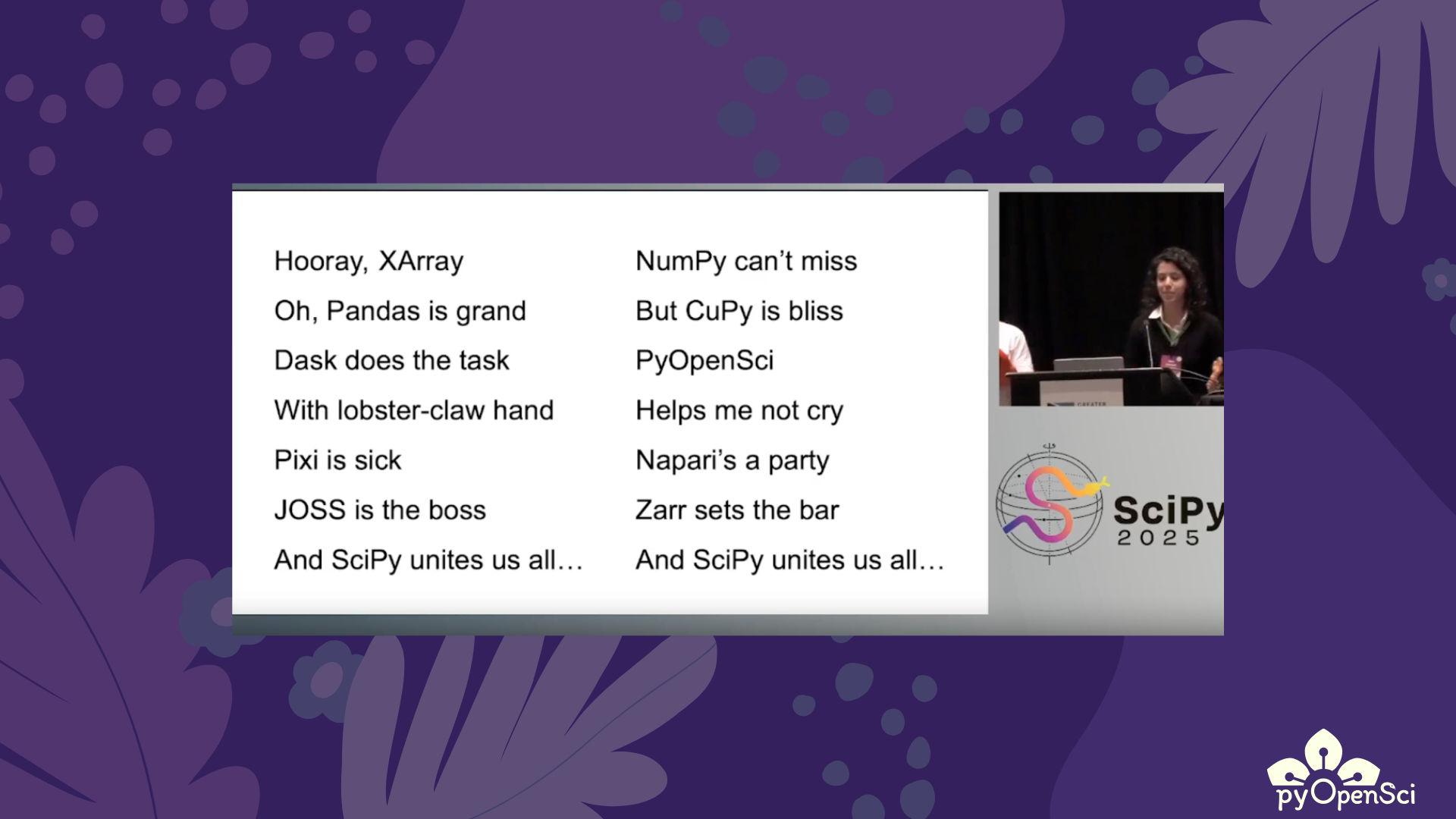
If you missed the conference, talks will be available on YouTube in the coming months—but the hallway track, where collaborations begin and friendships form? That’s the part you really have to experience in person. We hope to see you there next year.
What’s Next?
We’ll be following up on more posts soon, especially on:
- The community feedback we gathered during the BoF
- Lessons learned from teaching with UV, Hatch, and Pixi
- Updates to our packaging template and documentation
We’re also thrilled to announce a new collaboration:
pyOpenSci is partnering with the Stanford Open Source Program Office (OSPO) for our first joint event, happening August 7! This interactive session will explore how software peer review helps researchers build better tools, improve their coding practices, and gain academic recognition.
📅 Learn more: pyOpenSci x Stanford OSPO Peer Review Event
We’ll also be co-hosting a packaging workshop at Stanford later this year, so stay tuned for more details on that!
Join our Slack community
If you joined us during SciPy this year, thank you. Whether you were sprinting, chatting, teaching, or just soaking it all in, you helped make it special.
If you missed it but want to get involved, check out our volunteer page or come say hi in Slack.
Open science moves forward when we build it together, and SciPy 2025 reminded us just how much we can do when we do.
Connect with us!
There are lots of ways to get involved if you are interested!
- If you read through our lessons and want to suggest changes, open an issue in our lessons repository here.
- Volunteer to be a reviewer for pyOpenSci’s software review process.
- Submit a scientific Python package to pyOpenSci for peer review.
- Donate to pyOpenSci to support scholarships for future training events and the development of new learning content.
- Check out our volunteer page for other ways to get involved.
You can also:
- Keep an eye on our events page for upcoming training events.
Follow us on social platforms:
If you are on LinkedIn, check out and subscribe to our newsletter, too.
Connect with us!
There are many ways to get involved if you’re interested!
- If you read through our lessons and want to suggest changes, open an issue in our lessons repository here
- Volunteer to be a reviewer for pyOpenSci’s software review process
- Submit a Python package to pyOpenSci for peer review
- Donate to pyOpenSci to support scholarships for future training events and the development of new learning content.
- Check out our volunteer page for other ways to get involved.
You can also:
- Keep an eye on our events page for upcoming training events.
Follow us on social platforms:
If you are on LinkedIn, check out and subscribe to our newsletter.
You can also:
- Check out our Python Package Guide for comprehensive packaging guidance
- Keep an eye on our events page for upcoming training events
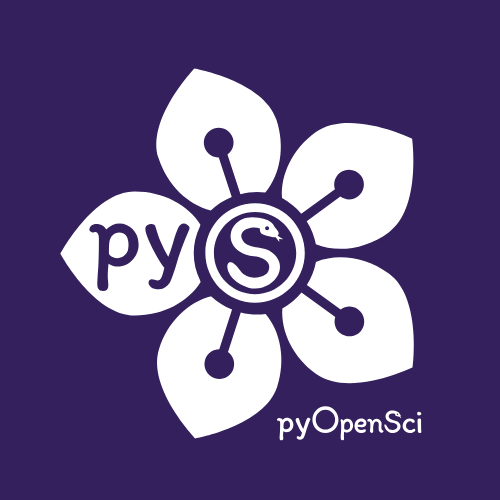
Leave a comment